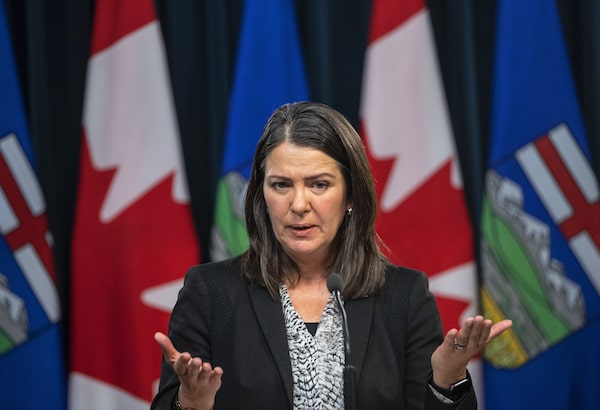
Alberta Premier Danielle Smith holds her first news conference in Edmonton on Oct. 11.JASON FRANSON/The Canadian Press
Alberta Premier Danielle Smith says she plans to shift the concentration of power within the provincial government toward rural communities at the expense of Calgary when she announces her cabinet on Friday, as she seeks to give MLAs and voters from areas that helped propel her campaign to lead the UCP a greater voice.
Ms. Smith, who won the United Conservative Party leadership earlier this month, is meeting with every MLA in her party, to get to know them better and understand their goals for public life. UCP MLAs, under her direction, will head to Sylvan Lake this week for a team-building retreat.
But while get-to-know-you sessions continue ahead of the cabinet shuffle, she has already revealed elements of her planned governmental makeover. MLAs representing rural ridings will be given more cabinet positions, weighting influence toward areas of the province she courted during her leadership campaign. Ms. Smith believes rural concerns during the COVID-19 crisis were drowned out at the cabinet table under her predecessor Jason Kenney. She wants to reverse that in her cabinet.
Ms. Smith has also signalled that she is willing to lose seats in Calgary in favour of the party maintaining its dominance in rural Alberta in the next general election.
“The Premier’s focus on having more rural MLAs in cabinet directly stems from rural Albertans having felt left out of the conversation,” Rebecca Polak, a spokesperson for Ms. Smith, said in a statement. ”This strategy ensures Albertans across the province have a voice at the cabinet table.”
Ms. Smith’s decision to broadcast her plans for cabinet, and willingness to sacrifice seats in Calgary, baffles veteran political pollster Janet Brown. As the UCP’s new leader, Ms. Smith must soothe divisions within the caucus, she said, and taking an early electoral writedown in Alberta’s largest city does little to build trust.
“What does that say to all the Calgary MLAs?” Ms. Brown said.
Calgary is widely considered to be where the 2023 election will be decided. Most political observers believe the New Democratic Party will continue to dominate Edmonton, while rural voters will stick with the UCP.
Alberta has 87 ridings, and parties traditionally need to win two of the province’s three clusters of constituencies – Calgary, Edmonton and the rest of the province – to form government. In the 2019 election, the UCP won 63 seats: 23 of Calgary’s 26 races; 1 of Edmonton’s 20 ridings; and 39 of the 41 seats outside the two big cities.
Ms. Smith told The Calgary Sun in an interview before her leadership victory that she wants to focus on retaining support in rural communities and mid-sized cities in order to maintain the UCP’s majority in the 2023 election. If the party can do that, she said, it can afford to take a hit in larger cities.
“Now we just need to win 10 to 15 seats in Calgary and Edmonton,” Ms. Smith told the newspaper. At the slimmest, this would reduce the UCP’s majority to 49 seats.
Ms. Smith argued that if the party pours effort into urban ridings, it could risk seats such as Rimbey-Rocky Mountain House-Sundre. But Calgary is rich in seats, meaning losses there could add up quickly if voters turn on the party. And Ms. Smith’s plan assumes that voters in smaller urban centres, including Red Deer, as well as those in the suburban doughnut around Edmonton, which includes seats such as Sherwood Park, will identify more with their rural counterparts than those in the big cities.
It also banks on ridings such as Banff-Kananaskis and Lesser Slave Lake sticking with the party, she said.
Assuming some of those ridings are a lock is risk for the party, Ms. Brown said.
“These are far from secure seats for the UCP.”
Ms. Smith, who does not have a seat in the legislature, will run in a by-election in Brooks-Medicine Hat on Nov. 8. Michaela Frey, a rookie UCP politician, won the riding with 60 per cent of the vote in 2019; she stepped down so the Premier could run. Ms. Smith, however, did not call a concurrent by-election for Calgary-Elbow, meaning the NDP and the Alberta Party’s Barry Morishita, the former mayor of Brooks, can concentrate their efforts on putting a dent in the Premier’s likely success.
The Premier explained that she wanted to run in Brooks-Medicine Hat, rather than the vacant Calgary-Elbow riding, because it is among the province’s rural seats and her leadership campaign aimed to empower those who felt disenfranchised during COVID-19. During an interview on Real Talk, a podcast hosted by Ryan Jespersen, Ms. Smith also confirmed she wanted more of her rural colleagues to join her in cabinet.
“There will be more rural representation,” Ms. Smith said before being sworn in as Premier on Tuesday. Part of the reason the UCP had a leadership race in the first place, she said, was because party members lost confidence in the top MLAs. Revising the makeup of cabinet is part of her putting her stamp on the party.
Ms. Smith won the UCP leadership on the sixth ballot.
Taleesha Thorogood, a consultant with Crestview Strategy who worked on Rebecca Schulz’s UCP leadership race, said that while Ms. Smith will focus on rural communities, that does not mean she will abandon Calgary. The forthcoming cabinet shakeup, Ms. Thorogood said, may leave some Calgary MLAs feeling jilted, but the electorate is likely to be less concerned.
She cautioned, however, that Ms. Smith must govern for all of the province. “Premier Kenney struggled to leave campaign-mode and move into governing,” Ms. Thorogood said. “That tenet has proven to be challenging for other conservative leaders.”
 Carrie Tait
Carrie Tait